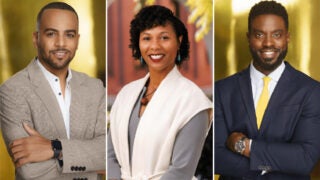Honoring Martin Luther King Jr. during a moment of racial reckoning
USC experts examine the civil rights leader’s life and legacy amid protests for racial justice and riots aimed at disrupting democracy.
The holiday honoring Martin Luther King Jr.’s life and legacy will take place on Monday, Jan. 18, and is the only federal holiday designated as a national day of service – a “day on, not a day off.”
King’s legacy was everywhere in the results of the most recent U.S. Senate elections in Georgia — where he was born, said Christian Grose, academic director of the USC Schwarzenegger Institute and an associate professor of political science and public policy at the USC Dornsife College of Letters, Arts and Sciences. Raphael Warnock is the first Black U.S. senator in the history of Georgia, a minister at the same church as King and only the second Black senator elected in the South since Reconstruction, which wouldn’t have been possible without civil rights activists like King fighting for the right to vote, Grose said.
“Yet this historic change that has roots in King’s legacy also belies restrictions to voter access in a number of counties in the South and beyond that exist today,” he noted. “Since 2013’s Shelby v. Holder Supreme Court decision, it has become easier for counties to make decisions such as closing polling places or changing electoral practices that impact voting rights for communities of color. What will be interesting to watch this MLK Day is whether Congress will choose to pass a new preclearance formula for the Voting Rights Act to reverse this Supreme Court decision.”
Chilling parallels between Capitol riots and violent backlash to Black freedom fighters
“We are seeing a lot of parallels between what happened at the Capitol last week and the backlash to Reconstruction in the 1870s through events like the Colfax massacre” — where white supremacists reacted with violence to an election where Black people had voted, said Ariela Gross, the John B. and Alice R. Sharp Professor of Law and History at the USC Gould School of Law and author of Becoming Free, Becoming Black: Race, Freedom and Law in Cuba, Virginia and Louisiana.
“The legacy of Martin Luther King Jr. and others like Rep. John Lewis, who was a mentor to Raphael Warnock and Jon Ossoff, is part of a long freedom struggle that in law school is often referred to as the second Reconstruction,” she said. “It was a struggle to give meaning to the 15th Amendment promise of voting rights and the 14th Amendment promise of protection under the law for all persons, which came to fruition in the 1960s. There was also an enormous backlash, and people like MLK Jr. were in grave physical danger and even assassinated.”
That King’s dream of racial equality has proven so elusive shows how strong and deep anti-Black bias runs in America.
Jody Armour
“It was very difficult to see the scenes at the Capitol last week and see a similar backlash to the power of Black voters and Black people claiming full citizenship in the United States,” she continued. “Black people in cities and in key states made the difference in the 2020 presidential and Senate elections, and it may have felt to a lot of people like a usurpation.” Gross noted that President Donald Trump built support for his 2016 presidential campaign in part through his “birtherism” claims that President Barack Obama wasn’t really a citizen.
“That King’s dream of racial equality has proven so elusive shows how strong and deep anti-Black bias runs in America,” said Jody Armour, the Roy P. Crocker Professor of Law at USC Gould and an expert on the relationship between racial justice, criminal justice and the rule of law.
“The appeal of Trump’s brand of ethno-nationalist demagoguery to many Americans highlights how far this nation still has to go in racial justice matters,” he said. “The rise of white nationalism and recent chaos in the Capitol cast doubt on the story of racial justice progress we like to tell ourselves since King’s assassination. At the same time, the energy and efficacy of the George Floyd protests over the summer affirm the hope and promise of change associated with King’s legacy.”
Will a ‘new religious left’ challenge the religious right?
King saw racial equality not just as a political issue but a moral and religious one as well. His reliance on his Christian faith in his calls for racial and economic justice is yet another way he remains relevant, said Richard Flory, senior director of research and evaluation at the USC Center for Religion and Civic Culture whose research focuses on religious innovation and change.
“Although the reality of a ‘new religious left’ remains elusive, there is an emerging consciousness among a broad diversity of religiously committed Americans of the need to address the challenges to democracy and equality represented by populist authoritarianism and supported by the American religious right,” he said.
“A new movement that challenges and competes with the religious right on its own grounds — religious beliefs and morality, and how those relate to equality, opportunity and free and open societies — would not only help to balance the dominant perception of the public role of religion in America but might also provide a new spiritual home for those who are alienated from religion because of the social and political agenda of the religious right.”
Civil rights leader was mindful of the power of the press
“When I think of Martin Luther King Jr.’s influence, I remain inspired by his skillful use of photojournalism to humanize the Black struggle,” said Allissa Richardson, an assistant professor at the USC Annenberg School for Communication and Journalism who researches how African Americans use smartphones and social media to produce innovative forms of journalism.
In so many ways, Dr. King was one of the original titans of multimedia.
Allissa Richardson
“He was masterful at wooing the press to cover his marches, sit-ins and speeches. Many people may not know that he and his contemporaries — like the late Rep. John Lewis or C.T. Vivian — timed many of their demonstrations to coincide with the 15-minute evening news broadcasts. We did not have 24-hour news cycles back then, so these leaders only had a small window of time to communicate their discontents visually.
“In so many ways, Dr. King was one of the original titans of multimedia, in pursuit of peace,” she said. “I think he would be proud of today’s citizen journalists who put their bodies in harm’s way to capture injustice and continue his work.”
King’s critique of ‘Do Nothingism’ rings true today
One way the holiday that honors King differs from others is its emphasis on service, a distinction that is even more important during a moment of deep racial divisions in America, says Shaun Harper, Provost Professor of Management and Organization at the USC Marshall School of Business and the USC Rossier School of Education and executive director of the USC Race and Equity Center.
“In his brilliant ‘Letter from a Birmingham Jail,’ Dr. King penned a critique of what he termed, ‘Do Nothingism.’ He argued that complacency is indeed complicity,” he said.
“The best way to honor King’s legacy is to do something — all we can, in fact — to end racial injustice, white supremacy, white nationalism, hate and evil. The inescapable racial realities of the tragic events at the U.S. Capitol on Jan. 6 make painstakingly clear that King’s dream for the U.S. remains unfulfilled. ‘Do Somethingism’ is required in these times.”



